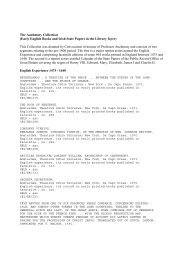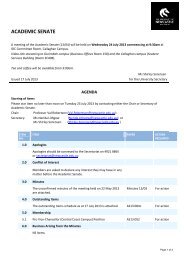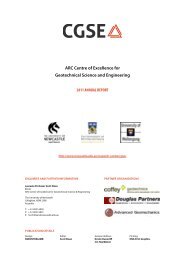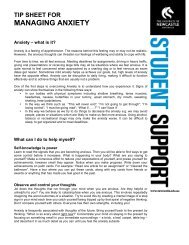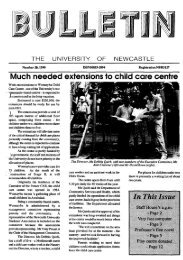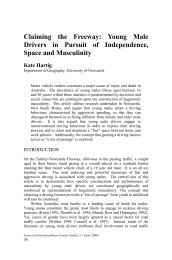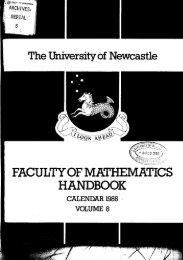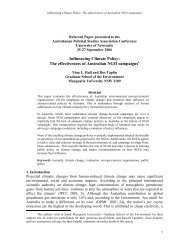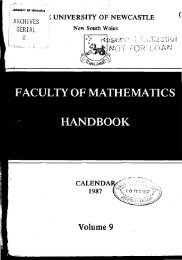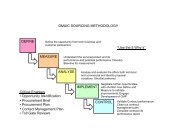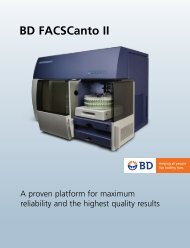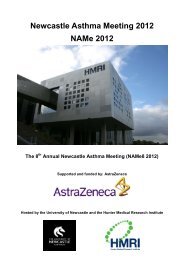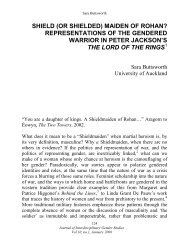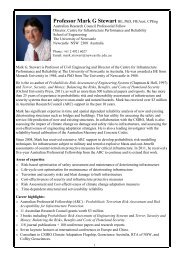n - University of Newcastle
n - University of Newcastle
n - University of Newcastle
Create successful ePaper yourself
Turn your PDF publications into a flip-book with our unique Google optimized e-Paper software.
6 8 A?? AUSTRALIAN LANGUAGE.<br />
Dzcnl pronouns are :-<br />
NO~.-(1) Ngalii, 'thou and I '; (2) ng6an-ngalligunna,<br />
'he and I ' ; (3) ngindubula, 'you t~o' ; (4) ngainbula,<br />
'they two7; (5) bulagual, 'the other ho7; (6) nginna bula,<br />
'these two'; (7) ngilla bula, 'those two7; (8) ngalliguyun-<br />
ganba, ' our two selves.'<br />
Of these, the inflexions <strong>of</strong> (3) are:-ge~t.,ngindub ulagu; dot.<br />
(ZocaZ), nginyundn, bulagu ; <strong>of</strong> (4):-yen. and dat., ngaggu-<br />
wanbulagu; ace., ngannainbula; ablafives, ngainbulabar,<br />
('about') ; ngaddainbuladi ('from') ; ngannainbulaga,<br />
(' in7) ; the inflexions <strong>of</strong> (8) are:-yen., guyungangalligin-<br />
bul; dat., ngalligingunnabul; ncc., ngallibulguyungan;<br />
abl., ngalligingunnabuli ('from').<br />
ReJZexice proltouns are :-<br />
Ngadduguyunganbul,'Imyself7; nginduguyunganbul,<br />
' thou thyself '; g6laguinguyunganbu1, 'he himself '; nga-<br />
lliguyunganbnl, 'we (two) ourselree'; ng8anniginya-<br />
ngagul, ' we ourselves.'<br />
Possessive Pronouns are :-<br />
Ngaddiguyungan, 'my own'; nginnuguynngan, 'thy<br />
omn'; gulaguiaguyungan, ' his own'; ng8annigirnindin-<br />
guyungan, ' our onn'; nginnugir~linguyuqan, 'your<br />
own'; ngaggualanindin, ' their own.'<br />
Denzonstrntit.es are :-<br />
Nginna. noanna, ngunnalla, nilla, dilla, 'this here7;<br />
ngaggualla, 'that one7; ngaggu, ' that.' The declension is :-<br />
azonz., nginna; yen., nginnagu, nginnalagu, 'belonging to<br />
this'; dot. (local), nginai, 'to this place'; ncc., nginna, 'this';<br />
ablatives, ngirinal-la (-an), ' at this,' nginnal-11 (-di), 'from<br />
tlis7; nginnadurai, ' with this.'<br />
5zdefigtite pronozcns are :-<br />
Ngunbaimarrang, 'some'; gulbir, 'part <strong>of</strong>, 'some'; ngunb<br />
ai, ' one'; ngunb aigual, ' another'; -pal (aposffix) 'other';<br />
biambnl, 'all,' 'the whole'; bianggallambul, 'all,' ' everybody<br />
'; minyam-minyan~bnl, ' ererything'; bulagual, 'the<br />
other two'; murrimurrri, 'each.'<br />
All the pronouns on this page are declined like nouns.<br />
Interrogatives are :-<br />
Nom. l.,ngandi,'mho (is) '? nom. 2., ngandu 'wlvl?o (does) '?<br />
gen., ngangu, 'whose'? dat., ngandigu, 'to or for whom7?<br />
nganngull (local) ; ablatives, ngangundi, 'from whom7 ?<br />
ngangundi birandi, 'away from whom'? ngangundidurai,<br />
'with whom'? ngangundila, 'from whom'? ngangurgu,<br />
' towards whom'?<br />
THE WIEADHAEI DIALECT. 69<br />
1Vona. 1. lllinyanganna, minyaggarranna, 'what (isit)'?<br />
~zont. 2., minyallu, 'what (does it) '? gen., minyangu or<br />
minyagguba, 'belonging to what'? clnf., minyaggu, 'to 01.<br />
for what'? ace., minyang, 'what'? ablnfives, minyaggurgu,<br />
'towards what' ? minyalla, 'in 01. on what' ? minyalalla,<br />
'on what7 ? minyalli, 'from what'? minyandurada, 'with<br />
what ' ? minpagguliadhi, 'like what'? minyaggnor, min-<br />
yaggarra, 'in what place ' 'where ' ?<br />
11. THE VOCABULARY.<br />
Words, Phrases, and Xentences in the Wh*tldlza;-i dialect.<br />
[In this Vocabulary, dy=j ; ng=either the nasal g or n-g in separate<br />
syllables ; -nga final <strong>of</strong> the verbals, if preceded by i, nlay be proiiouncec2<br />
-nya from the influence <strong>of</strong> the i ; p and t are so like b and ci in sound that<br />
the author has not given a separate place to them. llTords marlied with +<br />
have come in from other dialects. The verbs are given in the present Indi-<br />
cative ; to form the Infinitive, gu, 'to,' is added on after the verb-stem.<br />
There are probably some mistakes still in this Vocabulary, although much<br />
labour has been spent in getting its contents made fit for the press.-ED.]<br />
Ba-frost ; a cold winter.<br />
Babang-winter.<br />
B<br />
Baddabaddagijillinga-to<br />
the teeth together.<br />
gnash<br />
Babannirra-to make or to be Baddal-a kind <strong>of</strong> hair plaiting ;<br />
very hot. the hair made into a bunch.<br />
Babbildain-a singer. Bjddambirra-to catch fish.<br />
Babbilla-a wild cat. Baddan-sooner, before, ere.<br />
Babbimubang-fatherless. Baddang-a cloak, a blanket.<br />
Babbin-father. Baddangal--a long-marriedman<br />
BBbbir-large. Baddanni-the gum <strong>of</strong> a tree.<br />
Babbirbambarra-to sing a song. Baddarbaddar-a native bird.<br />
Babbirbang-slender. B6ddarra-to bite.<br />
Babbirra-to sing. f Baddawal-the native weapon<br />
BBbin-a nettle. known as the ' bumarang '; cf.<br />
Badanin-the gu~n <strong>of</strong> the ' kur- ' bargan.'<br />
rajong' tree. Baddawar-a weapon like the<br />
Badda-a bite. ' bargan,' but with a knob at<br />
Badda-the bank <strong>of</strong> the river. one end.<br />
Baddabaddambul-very soon. Baddawaral-a dry plain.<br />
Baddabaddarra-to scrape and Baddiang-nonsense.<br />
then use the teeth like a dog. Badding-an edible root.



